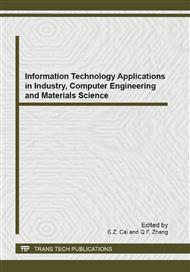[1]
Bao, J. Caragea, D. and Honavar, V.G. Modular Ontologies – A Formal Investigation of Semantics and Expressivity. In proc. of ASWC2006, pp.616-631. Springer, Heidelberg. (2006).
DOI: 10.1007/11836025_60
Google Scholar
[2]
Bao, J. Caragea, D., and Honavar, V. A Distributed tableau algorithm for package-based Descrption Logics. In the 2nd International Workshop On Context Representation And Reasoning(CRR2006), (2006).
Google Scholar
[3]
Borgida, A. and Serafini, L. Distributed Description Logics: Directed Domain Correspondences in Federated Information Sources. In proc. of CoopIS/DOA/ ODBASE2002, pp.36-52. (2002).
DOI: 10.1007/3-540-36124-3_3
Google Scholar
[4]
Borgida,A., and Serafini,L. Distributed description logics: Assimilating information form peer sources. Journal on Data Semantics. pp.153-184. (2003).
DOI: 10.1007/978-3-540-39733-5_7
Google Scholar
[5]
Chen, H., Wu, Z., Wang, H. and Mao, Y. RDF/RDFS-based Relational Database Integration. In proc. of ICDE2006. (2006).
DOI: 10.1109/icde.2006.127
Google Scholar
[6]
Dou, D., LePendu, P. Ontology-based Integration for Relational Databases. In proc. of SAC2006, Dijon France, pp.461-466. (2006).
Google Scholar
[7]
Fahad, M., Moalla, N., Bouras, A. Towards ensuring Satisfiablity of Merged Ontology. Procedia Computer Science, vol4, pp.2216-2225. (2011).
DOI: 10.1016/j.procs.2011.04.242
Google Scholar
[8]
Flouris,G., Manakanatas, D., Kondylakis, H., Plexousakis, D. and Antoniou, G. Ontology change: classification and survey. The Knowledge Engineering Review, vol. 23: 2, pp.117-152. Cambridge University Press. (2008).
DOI: 10.1017/s0269888908001367
Google Scholar
[9]
Grau B.C., Parsia, B. an Evren Sirin. Combining OWL ontologies using E-connections. Journal of Web Semantics, vol. 4, pp.40-59. (2006).
DOI: 10.1016/j.websem.2005.09.010
Google Scholar
[10]
Jimernez-Ruiz, E., Grau, B.C., Horrocks, I., and Rafael Berlanga. Ontology Integration Using Mappings: Towards Getting the Right Logical Consequences. In proc. of ESWC2009, pp.173-187. Springer Heidelberg. (2009).
DOI: 10.1007/978-3-642-02121-3_16
Google Scholar
[11]
Pan J.Z., Serafini, L. and Zhao, Y. Semantic Import: An Approach for Partial Ontology Reuse. In 1st International Workshop on Modular Ontologies(WoMo2006), co-located with ISWC2006. (2006).
Google Scholar
[12]
Serafini,L., Tamilin, A. DRAGO: Distributed Reasoning Architecture for the semantic web. In proc. of ESWC2005, pp.361-376. Springer, Heidelberg. (2005).
DOI: 10.1007/11431053_25
Google Scholar
[13]
Serafini, L., Borgida, A. Tamilin, A. Aspects of distributed and modular ontology reasoning. In proc. of IJCAI2005. (2005).
Google Scholar
[14]
Wache,H., Vogele, T., Visser, U., Stuckenschmidt, H., Schuster, G, Neumann, H. and Hubner, S. Ontology-based Integration of Information – A survey of existing approaches. In proc. of IJCAI2001, Seattle, WA. pp.108-117. (2001).
Google Scholar


